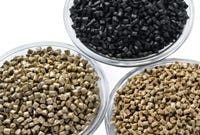Sign up for the PlasticsToday NewsFeed newsletter.
Sponsored By
Modified PEEK grades save on resin costs
Interest among plastics processors in polyetheretherketone (PEEK), an engineering thermoplastic that offers a mighty array of mechanical properties including very high heat resistance and strength, is dampened by the material’s price tag, which exceeds $10/lb.
Matt Defosse
April 28, 2009
2 Min Read

Blending PEEK with other crystalline thermoplastics can lower a processor’s resin costs without stripping away valuable mechanical properties.
Interest among plastics processors in polyetheretherketone (PEEK), an engineering thermoplastic that offers a mighty array of mechanical properties including very high heat resistance and strength, is dampened by the material’s price tag, which exceeds $10/lb. One outcome has been the development of a number of compounds that combine PEEK with other crystalline thermoplastics in a bid to help processors and parts designers avoid over-engineering and to reduce the material’s cost.For example, plastics supplier Solvay Advanced Polymers (Alpharetta, GA) has launched its AvaSpire AV-700 series of modified PEEK grades to help “fill the cost/performance gap” between high-performance plastics such as polyphenylene sulfide (PPS), liquid crystal polymer (LCP), or high-temperature polyamide, and PEEK. These PEEK-based formulations are available in unfilled, filled, and wear-resistant grades and, reports Solvay, can compete with standard PEEK grades but at prices as much as 30% less. The six grades in the range have melt viscosities and processability comparable to those of standard PEEK grades and can be injection molded or extruded on conventional processing machinery. Targeted applications are in automotive, oil and gas recovery, semiconductors and chemical processing, among others.
Solvay AP already markets its Torlon polyamide imide (PAI) for seal rings, thrust washers and similar parts, but PAI requires curing post-mold; PEEK does not.
During the Plastics in Automotive Engineering conference in Mannheim, Germany in March, Wolfgang Funke, business development representative at Solvay AP, told MPW that the AvaSpire modified PEEK grades already are finding favor in the market as they help processors get the PEEK attributes they need without overengineering. “Depending on the other plastics used, you can increase the glass transition temperature (of PEEK) quite a bit,” he noted. He cited new double-clutch systems on cars as one application in which he predicts these compounds eventually could see use.
The PEEK supply leader, Victrex, offers blends of its flagship PEEK resin with Extem thermoplastic polyimide (TPI) from Sabic Innovative Plastics, but most recently introduced a grade of straight PEEK, Victrex ST, which it says is designed to see use in applications requiring a combination of high temperature, mechanical performance and dimensional stability. The new polymer launches with two grades: STG45 polymer (an unfilled grade) and ST45GL30 polymer (a glass-filled grade).
According to Victrex, ST ST45GL30 grade has a heat distortion temperature of 380°C; combined with PEEK’s chemical resistance and dimensional stability, this high HDT could open a number of underhood automotive applications to thermoplastics, as well as others applications in aggressive environments.
The third leading supplier of PEEK, Evonik, earlier this year announced the launch of a new range of PEEK grades aimed at medical applications. —[email protected]
About the Author(s)
You May Also Like


